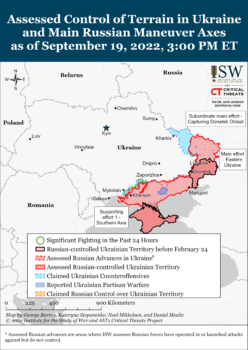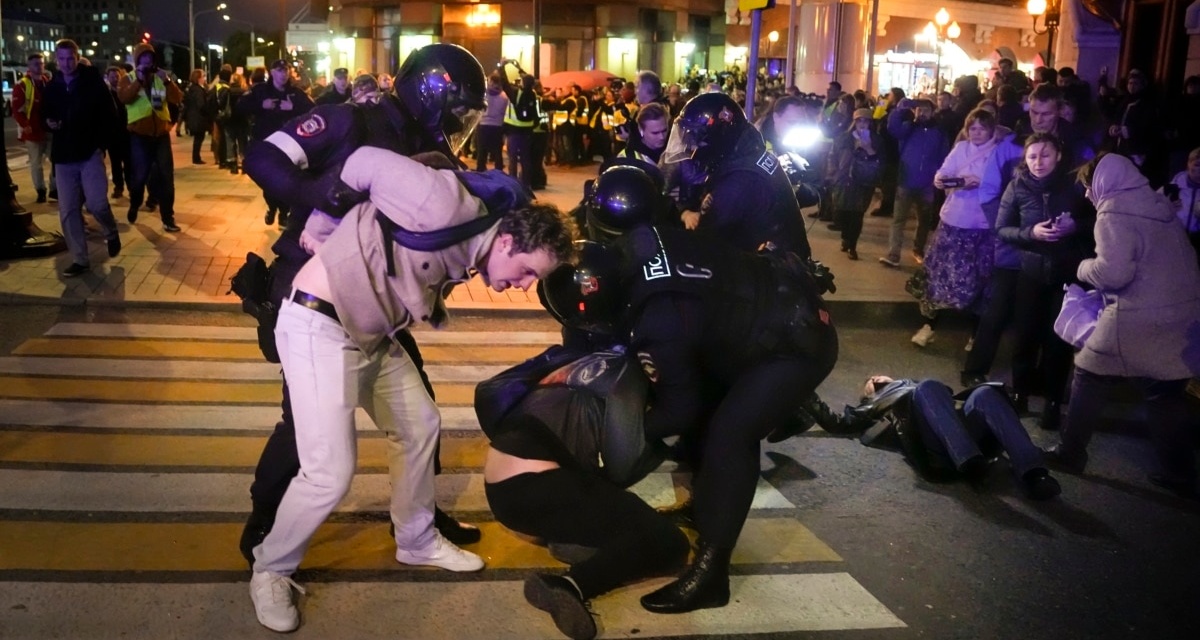Riot police detain demonstrators during a protest against Vladimir Putin’s “partial mobilization” of reservists, Moscow, Russia, September 21, 2022 (AP)
Jump to Original Entry
Friday’s Coverage: Russia’s “Disfunctional Command Structure”

Source: Institute for the Study of War
UPDATE 1805 GMT:
More rumbling within Russia about Vladimir Putin’s “partial mobilization” (see Original Entry)….
The head of the Kremlin’s Human Rights Council, Valery Fadeyev, said he wrote Defense Minister Sergey Shoygu with a request to “urgently resolve” problems.
Fadeyev criticized how exemptions were being applied, as well as inappropriate enlistment such as nurses and midwives with no military experience.
He added, “Some [recruiters] hand over the call-up papers at 2 am, as if they think we’re all draft dodgers.”
Margarita Simonyan, editor-in-chief of Russia Today and a diehard Putin loyalist, wrote on Telegram:
It has been announced that privates can be recruited up to the age of 35. Summonses are going to 40-year-olds
They’re infuriating people, as if on purpose, as if out of spite. As if they’d been sent by Kyiv.
The governor of the Buryatia region on the Mongolian border acknowledged that men were receiveing papers in error. He promised those who have not served in the army or who have medical exemptions will not be called up.
Tsakhia Elbegdorj, former President of Mongolia and now head of the World Mongol Federation, called out to the ethnic Mongols in Russia. Wearing a ribbon in Ukrainian yellow and blue, he said:
The Buryat Mongols, Tuva Mongols, and Kalmyk Mongols have…been used as nothing more than cannon fodder….
Today you are fleeing brutality, cruelty and likely death. Tomorrow you will start freeing your country from dictatorship.
UPDATE 1705 GMT:
Vladimir Putin has signed a law authorizing a prison sentence of up to 10 years for Russian troops who refuse to fight, desert, disobey commands, or surrender to the enemy.
UPDATE 1700 GMT:
The Kremlin has dismissed Deputy Defense Minister, Dmitry Bulgakov, who was in charge of military logistics during the Ukraine invasion.
Col. Gen. Mikhail Mizintsev, the head of the National Defence Management Centre who oversaw Russia’s 12-week assault on the port city of Mariupol in southern Ukraine, has been appointed to the post.
UPDATE 1651 GMT:
Unsettled that Ukraine has downgraded diplomatic ties over the Iranian supply of drones to Russia, Tehran has “advised” Kyiv to “refrain from being influenced by third parties who seek to destroy relations between the two countries”.
Kyiv stripped the Iranian ambassador of his accreditation after Russia began using the Shahed-136 “kamikaze drones”, hundreds of which have reportedly been despatched to cover Moscow’s shortage of effective unmanned aerial vehicles.
Ukraine forces have downed several of the drones, but others have attacked both military and civilian targets (see 1023 GMT).
While Iran has officially denied the supply, the newspaper Keyhan — an outlet of the Supreme Leader — boasted about it on Saturday.
Quite the statement from Keyhan, whose chief editor is appointed by the supreme leader.
It says in its Saturday edition that by the time Western media reported that Iran had started training Russians on how to use Iranian drones, "their training had almost ended". pic.twitter.com/9uswUEXwLQ
— Kian Sharifi (@KianSharifi) September 24, 2022
UPDATE 1023 GMT:
Russian forces have used Iranian-supplied “kamikaze drones” to attack the port city of Odesa on the Black Sea.
Two people were killed and two injured in Friday’s attack with Shahed-136 UAVs.
See also US Sanctions Iran Firms Over Drones To Russia
In the Kharkiv region in the northeast, Russian shelling near recently-liberated Kuplyansk injured five civilians, including two children.
UPDATE 1009 GMT:
While conducting staged referenda in occupied areas, Russian forces are continuing their attacks on nearby Ukrainian-held territory.
In the Zaporizhzhia region in the south, one person was killed and seven injured when a missile hit an apartment building and started a fire.
In Donetsk in the east, two civilians were killed and three injured.
UPDATE 0636 GMT:
In his nightly address to the nation, Ukraine President Volodymyr Zelensky has appealed to people living under Russian occupation: “Save your lives, help us weaken and destroy the occupiers.”
Zelenskiy said those in the Russian-occupied territories should “hide from Russian mobilization by any means, avoid conscription letters, and try to get to the free territory of Ukraine”.
UPDATE 0625 GMT:
Russian officials have made up some numbers for the first day of “referenda” to justify Moscow’s annexation of occupied territory in eastern and southern Ukraine.
Russian State media said turnout on Friday in the Donetsk region in the east was 23.6%. In the south, it was more than 20.5% in Zaporizhzhia and 15% in Kherson.
“In our view, that’s enough for the first day of voting,” the head of Kherson’s Russian-installed election commission, Marina Zakharova, said.
The referenda are being staged through Tuesday.
Ukraine President Volodymyr Zelenskiy assured in his Friday night address to the nation, “”The world will react absolutely fairly to sham referenda – they will be unequivocally condemned – and to the criminal mobilization that the occupiers are currently trying to carry out in Crimea and other parts of Ukraine which they control so far.”
ORIGINAL ENTRY: Russian concerns are rising over Vladimir Putin’s “partial mobilization” to check impending defeat in his invasion of Ukraine.
On Tuesday, just after Putin’s announcement, Defense Minister Sergey Shoygu said the measure would call up 300,000 reservists with military experience. But, amid reports that the Kremlin is seeking more than a million people, Russian officials appeared to be sweeping up men with no training, let alone service on the battlefield.
Detained protesters are being served draft notices. Police have pulled university students from lessons, breaking Shoygu’s pledge that students would not be called up. Russian enlistment officers and police are calling men on their phones, issuing notices in the middle of the night, and notifying men of their mobilization via state social benefits websites.
Another revealing video. Scene inside a mustering station in Russia where an officer yells at angry, resentful men who have been mobilized.
“That’s it- playtime’s over. You’re soldiers now!”
pic.twitter.com/oTfomvgsUf— Patrick Reevell (@Reevellp) September 23, 2022
The US-based Institute for the Study of War summarizes, “The Russian mobilization system is struggling to execute the task Russian President Vladimir Putin set and will likely fail to produce mobilized reserve forces even of the low quality that Putin’s plans would have generated unless the Kremlin can rapidly fix fundamental and systemic problems.”
Military bloggers, some of whom have called for a full mobilization, noted the haphazard approach of the Russian bureaucracy. Those reservists who do have prior military service are being assigned to different specializations from those in which they have training. Recruitment centers are even signing up men with chronic illnesses. Staff at the centers are unmotivated and underpaid, the bloggers complained.
The ISW adds, “Disparate mobilization processes across different regions may exacerbate social tensions in Russia already raised by perceived inequalities in the creation of volunteer battalions.”
It notes that Chechen leader Ramzan Kadyrov, normally a staunch supporter of Putin, said Chechnya will not conduct mobilization. He claimed that the area has already exceeded a supposed force generation plan by 254%, and deployed 20,000 men to war in the Ukraine invasion.
Miles-long traffic jams continued to be reported on Russia’s borders with countries from Finland to Georgia, as some men try to escape the call-ups.
The queue at the border between Russia and Georgia is about 10 km (6.2 miles) long, with people waiting more than 20 hours to cross and men using scooters to bypass the line.
The Georgia-Russia border at Verkhny Lars is often tailed-back, but the social media footage of it today is insane. Spot the guys crossing on scooters, avoiding the ban on pedestrians. https://t.co/6NKoqqE4Gt pic.twitter.com/e3RS82B905
— Felix Light (@felix_light) September 23, 2022
Analysts assess that the mobilization will have little immediate effect on the battlefield. They note Russia will have difficulty quickly deploying the reservists given problems with supply lines, communications, and morale.
Battlefield reports on Wednesday indicated that, in their counter-offensive in the northeast, Ukraine’s forces are continuing to advance north and northwest of Lyman. The city, east of Kharkiv, is a key rail hub. Its loss would further enable the Ukrainians not only to reclaim territory seized by the Russians in the invasion, but also to close on parts of the Donetsk and Luhansk regions held by Russian proxies since 2014.

